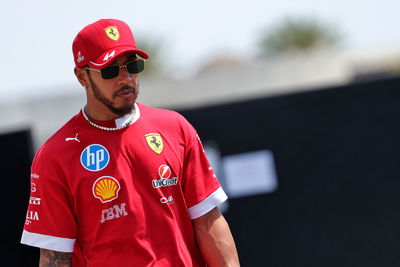The dangerous precedent set by F1 drivers' lax approach to COVID-19

25 percent of the Formula 1 grid has now tested positive for coronavirus in the past six months, with Charles Leclerc becoming the fifth driver to do so.
F1’s flexibility and stringent approach enabled it to carry out its rewritten, 17-round 2020 campaign with great success and in a safe manner amid the global pandemic. There were fewer than 100 positive coronavirus results returned from the 80,000 tests the championship carried out throughout the year.
Despite teams operating within bubbles and adhering to strict hygiene protocols, three of the 2020 drivers, including world champion Lewis Hamilton, missed races with positive tests.
Earlier this month, it was announced that Lando Norris had contracted COVID-19 while on vacation in Dubai ahead of a planned training camp as he gears up his preparations for the upcoming 2021 season.
Less than two weeks later, Leclerc became the latest driver to test positive, with the Ferrari driver announcing his diagnosis via social media on Thursday, before his team confirmed that he had tested positive on Wednesday.
“I hope you are all staying safe,” Leclerc said on Instagram. “I want to let you know that I have tested positive for COVID-19. I am regularly checked according to my team’s protocols.
“Unfortunately, I learned that I have been in contact with a positive case and immediately went into self-isolation, notifying anyone I had contact with. A subsequent test I took has come back positive.
“I am feeling OK and have mild symptoms. I will remain in isolation in my home in Monaco in compliance with the regulations set by the local health authorities. Stay safe and take care.”
Like Norris, the 23-year-old had recently been holidaying in Dubai during the off-season with his girlfriend and said he took a test in response to being notified that he had come into contact with a positive case.
Leclerc shared regular updates about his trip and was pictured meeting up with celebrities including former Manchester United footballer Patrice Evra and entrepreneur Saif Ahmad Belhassa.
Given the timeframe at play, it is more than likely that Leclerc came into contact with a contagious person while he was out in Dubai, a country that had been advertising itself as a lockdown-free holiday destination.
With the start of a new F1 season two months away, and considering the current global crisis caused by the pandemic - with concern over new variants, many European countries entering strict lockdowns, and health services on their knees - it seems rather careless for drivers to be taking such risks for the sake of a vacation.
Particularly so, when they are broadcasting their lavish lifestyles all over social media for millions of followers to see. At present, it is completely the wrong message to be sending out. F1 drivers, like all famous people, have a platform, and with it comes responsibility.
The aim of this article is not to single-out Leclerc for criticism - we wish him a speedy recovery - rather, it is highlighting a worrying pattern. He is simply one of the drivers to have made the fact he is on holiday public (others have remained very quiet), and it is not the first time he has found himself in hot water over a coronavirus-related transgression.
Back in July, Leclerc was given an official warning from the FIA for breaking F1’s coronavirus protocols by making a return trip home to Monaco between the Austrian and Styrian Grands Prix and was pictured with friends.
Mercedes driver Valtteri Bottas also returned to Monaco at the same time, though he was not found to have breached the guidelines as he stayed within his permitted bubble.
Later that month, Sergio Perez became the first driver to test positive for coronavirus and was forced to miss both races at Silverstone.
It later emerged Perez had returned home to Mexico after the Hungarian Grand Prix to visit his mother in hospital, travelling on a private plane. No one could question Perez’s understandable reasoning for making such a trip.
However, some controversy followed when his wife Carola Martinez posted on her Instagram account multiple images of the pair at restaurants in Mexico, as well as what appeared to be a family vacation in Italy around the same time. These images were hastily deleted in the wake of Perez’s positive test.
Perez hit back at claims he met with a sponsor and fans during his trip back to Mexico, calling the reports “bullshit”, but it certainly raised some questions over how closely the drivers were following F1’s strict procedures, as well as acting as a warning for the rest of the paddock.
His teammate Lance Stroll was the next driver to test positive, forcing Racing Point to defend their COVID-19 procedures, insisting they could not do any more to protect against coronavirus.
What then followed was one of the biggest stories of the season as seven-time world champion Hamilton tested positive, ruling him out of the Sakhir Grand Prix and paving the way for George Russell’s Mercedes debut.
Hamilton showed that even a physically fit athlete can be affected by COVID-19, admitting the virus “destroyed him” and left him “just happy to be alive” after finishing third on his return to action at the season-ending Abu Dhabi Grand Prix.
The 36-year-old Briton had been in Dubai with his family, including father Anthony and brother Nicolas, before he travelled to Bahrain for the double-header of races. After returning two negative results across the Bahrain Grand Prix, Hamilton tested positive on the Monday following the race after being informed that a member of his bubble had contracted the illness.
Since the season finale in mid-December, a number of the drivers have enjoyed holidays during the off-season, with Red Bull’s Max Verstappen, for example, travelling to Brazil, where death rates are high amid growing concern over a new variant of coronavirus in the country.
In normal times, such activities would be expected. But the stark reality is that we are far away from that as the world continues to combat the ongoing crisis.
With the new season fast approaching, drivers’ attention should surely be on ensuring they are remaining fit and healthy. A positive COVID-19 result on the eve of the new season would certainly cause their respective teams a real headache.
While it is hard for teams to impose draconian rules on their employees during their free time outside of the paddock, could more not be done to encourage the behavioral changes that millions of citizens across the globe have been forced to follow?
This is not just a problem exclusive to F1. A number of footballers have faced criticism amid increased restrictions in the United Kingdom and the introduction of a third national lockdown.
Premier League clubs West Ham and Tottenham notably moved to condemn players who ignored or broke COVID-19 regulations over Christmas and the New Year before proceeding to flaunt it over social media.
However invincible F1 drivers may feel, it is proven that COVID-19 can affect anyone, and the long-term health damage that can be associated with the virus seems a huge gamble for them to willingly risk. At best it shows naivety. At worst, a complete disregard for the health of themselves and those around them.
Some drivers appear to be letting their guard down, and it’s a worrying and dangerous precedent to be setting in the current climate.











